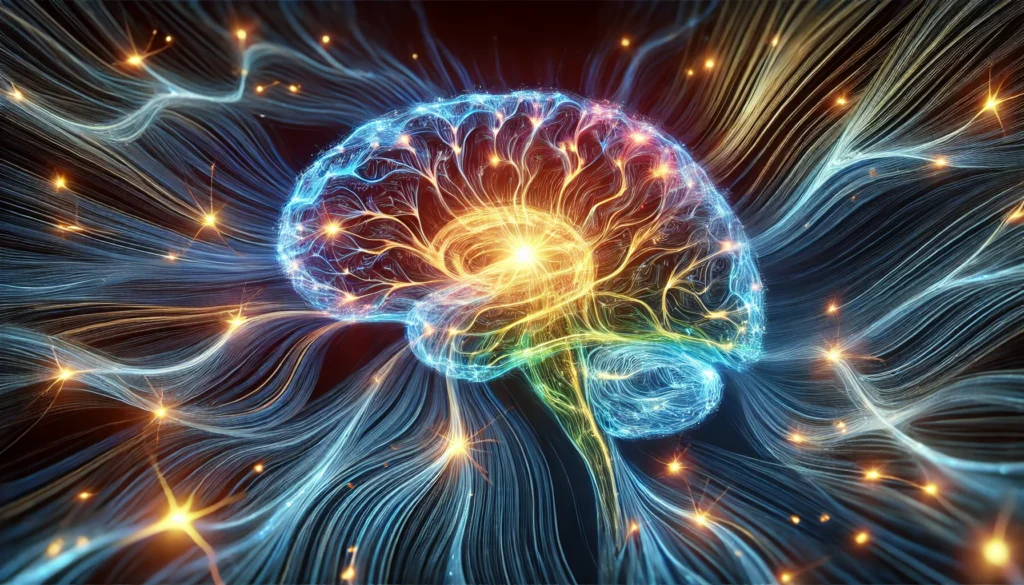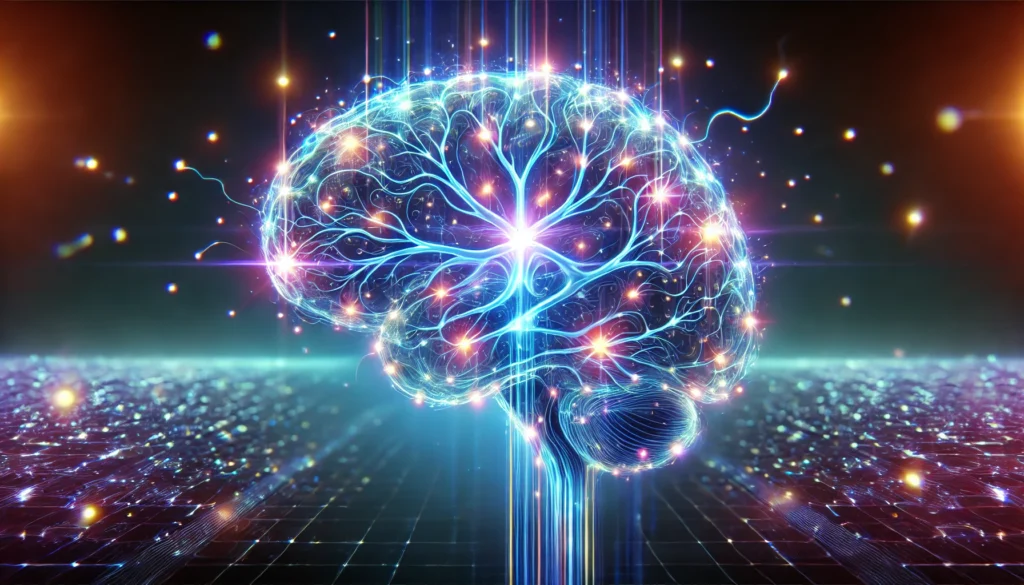Understanding Brain Chemistry and Neural Pathways
The human brain is an intricate network of neurons, neurotransmitters, and synaptic connections that work in harmony to facilitate memory, learning, and recall. At the heart of these processes lies brain chemistry, which determines how efficiently neurons communicate and adapt over time. The concept of neural plasticity, or the brain’s ability to reorganize itself by forming new neural connections, is central to memory and cognitive function. By actively engaging in habits and interventions that influence brain chemistry, individuals can strengthen their neural pathways, ultimately improving memory retention and recall.
You may also like: How to Increase Neuroplasticity: Strengthening Neural Pathways for Better Memory & Recall
Brain chemistry is shaped by a variety of factors, including genetics, environment, lifestyle choices, and cognitive engagement. Neurotransmitters such as dopamine, acetylcholine, glutamate, and serotonin play essential roles in cognitive function, mood regulation, and synaptic plasticity. When these chemical messengers are in optimal balance, memory formation and retrieval are significantly enhanced. However, when imbalances occur—due to stress, aging, poor nutrition, or neurological disorders—cognitive decline can result. Understanding how to leverage brain chemistry for cognitive improvement offers a powerful means of enhancing mental acuity and long-term brain health.
The Role of Neurotransmitters in Memory and Recall
Neurotransmitters serve as the chemical foundation of brain function, influencing neural communication, memory formation, and cognitive performance. Dopamine, often associated with motivation and reward, also plays a vital role in learning and memory consolidation. Higher dopamine levels enhance focus and the ability to retain information, making it an essential neurotransmitter for students and professionals alike. Acetylcholine, another crucial neurotransmitter, is deeply involved in encoding new memories and maintaining attention. Low levels of acetylcholine are linked to memory deficits and neurodegenerative diseases like Alzheimer’s.
Glutamate, the brain’s primary excitatory neurotransmitter, is directly tied to synaptic plasticity and long-term potentiation, which is the strengthening of synapses that occurs with repeated stimulation. This process underpins learning and the ability to recall information over time. Conversely, excessive glutamate activity can lead to excitotoxicity, a condition in which neurons become overstimulated and eventually die. Thus, maintaining a balanced level of glutamate is crucial for cognitive longevity. Serotonin, although primarily recognized for its role in mood regulation, also affects memory formation and the ability to process complex information. Modulating these neurotransmitters through diet, supplementation, and lifestyle choices can significantly enhance memory retention and recall.
How Brain Change Enhances Cognitive Function
Brain change is a dynamic process driven by neuroplasticity, the brain’s ability to adapt in response to experiences, learning, and environmental stimuli. This adaptability is particularly evident in memory formation, where repeated exposure to new information strengthens neural connections. When individuals engage in mental exercises, novel learning experiences, and cognitive challenges, their brains undergo structural and chemical changes that facilitate better recall.
One of the most fascinating aspects of brain change is its potential for lifelong learning and cognitive resilience. Even in adulthood, the brain remains capable of forming new synaptic connections, countering the outdated notion that cognitive decline is inevitable with age. Activities such as learning a new language, playing a musical instrument, or engaging in strategic games stimulate different areas of the brain, reinforcing neural pathways and improving memory performance. Additionally, mindfulness practices, meditation, and adequate sleep support neurogenesis—the creation of new neurons—which further enhances cognitive function.

Diet and Nutrition for Optimizing Brain Chemistry
Nutrition plays a pivotal role in regulating neurotransmitter levels and supporting cognitive function. Omega-3 fatty acids, found in fatty fish, flaxseeds, and walnuts, are essential for maintaining neuronal integrity and synaptic function. These fatty acids enhance membrane fluidity, which facilitates efficient neurotransmitter signaling and reduces neuroinflammation. Antioxidant-rich foods, such as berries, dark chocolate, and green leafy vegetables, combat oxidative stress, protecting brain cells from damage and supporting long-term memory retention.
A diet rich in choline-containing foods, such as eggs, liver, and soybeans, promotes the synthesis of acetylcholine, thereby improving focus and learning ability. Magnesium, an essential mineral, regulates NMDA receptors, which are critical for synaptic plasticity and memory consolidation. Deficiencies in magnesium have been linked to cognitive impairments and an increased risk of neurodegenerative conditions. Incorporating a well-balanced diet that prioritizes brain-supporting nutrients can significantly enhance memory and cognitive resilience.
Exercise and Brain Health
Physical exercise is one of the most effective methods for stimulating brain change and enhancing neural pathways. Aerobic activities such as running, swimming, and cycling increase blood flow to the brain, delivering oxygen and essential nutrients that support neuronal health. Exercise also promotes the release of brain-derived neurotrophic factor (BDNF), a protein that facilitates synaptic plasticity, neurogenesis, and overall cognitive function.
Resistance training and high-intensity interval training (HIIT) have been shown to improve memory performance by increasing levels of neurotransmitters like dopamine and norepinephrine. Yoga and tai chi, which combine physical movement with mindfulness, enhance cognitive function by reducing stress-induced cortisol levels and promoting relaxation. By integrating regular physical activity into daily routines, individuals can harness the benefits of exercise to strengthen their neural pathways and improve memory retention.
Cognitive Training and Memory Enhancement
Engaging in cognitive training exercises is a powerful method for reinforcing neural connections and enhancing memory recall. Techniques such as mnemonic devices, visualization strategies, and spaced repetition help strengthen memory pathways by encouraging active retrieval and consolidation. Brain-training apps, puzzles, and problem-solving activities challenge cognitive abilities, leading to measurable improvements in recall and information processing speed.
Practicing mindfulness meditation has also been shown to enhance working memory and attentional control. By training the mind to focus on the present moment, individuals can improve their ability to encode and retrieve information efficiently. Moreover, engaging in continuous learning, whether through formal education, self-directed study, or intellectual discussions, fosters neuroplasticity and contributes to long-term cognitive health.
The Impact of Sleep on Memory and Brain Chemistry
Sleep is an essential factor in brain chemistry regulation and memory consolidation. During deep sleep, the brain undergoes critical processes that reinforce neural pathways and solidify newly acquired information. The glymphatic system, a waste-clearance system in the brain, becomes highly active during sleep, removing neurotoxins and supporting overall cognitive function.
REM sleep, in particular, plays a crucial role in memory processing and problem-solving. Individuals who experience consistent, high-quality sleep exhibit better recall and cognitive performance compared to those who suffer from sleep deprivation. Establishing a sleep routine, minimizing exposure to blue light before bedtime, and practicing relaxation techniques can all contribute to improved sleep quality and enhanced memory function.

Frequently Asked Questions (FAQ) on Changing Brain Chemistry and Strengthening Neural Pathways
1. How does changing brain chemistry influence long-term memory formation?
Changing brain chemistry affects long-term memory formation by altering the strength and efficiency of synaptic connections between neurons. When neurotransmitter levels are optimized, especially acetylcholine and glutamate, they facilitate stronger encoding and retrieval of information. A key factor in brain change is neuroplasticity, which allows the brain to adapt by reinforcing frequently used neural pathways while pruning weaker connections. This process ensures that essential memories are consolidated while unnecessary or outdated ones fade over time. To support long-term memory, lifestyle adjustments such as deep learning strategies, targeted supplementation, and mindfulness techniques can be effective in promoting favorable brain chemistry changes.
2. Can diet alone drive meaningful brain change, or are other factors equally important?
While diet plays a significant role in brain change by influencing neurotransmitter production and reducing inflammation, it is not the sole determinant of cognitive enhancement. Factors such as sleep, mental stimulation, social interaction, and stress management contribute significantly to how well the brain adapts and strengthens memory pathways. A diet rich in omega-3 fatty acids, antioxidants, and choline supports cognitive function, but without adequate rest and mental engagement, the benefits may be limited. The interaction between nutrition and other lifestyle factors is essential for sustained cognitive improvements. A holistic approach that includes exercise, meditation, and structured learning activities is crucial for optimizing brain chemistry in a meaningful and lasting way.
3. What role does stress play in changing brain chemistry, and how can it be managed for better recall?
Chronic stress negatively impacts brain change by increasing cortisol levels, which can interfere with synaptic plasticity and damage the hippocampus, a critical region for memory. When stress hormones remain elevated over long periods, they inhibit the formation of new neural connections and impair recall abilities. Effective stress management techniques such as mindfulness meditation, deep breathing exercises, and physical activity can counteract these effects. Additionally, adopting adaptive coping mechanisms like reframing stressful situations and maintaining strong social support networks helps preserve optimal brain chemistry. Regular relaxation practices ensure that stress does not hinder cognitive function and memory recall over time.
4. How does physical activity contribute to brain change and cognitive function?
Physical activity fosters brain change by increasing blood flow to the brain, supplying oxygen and essential nutrients that support neural function. Exercise also triggers the release of brain-derived neurotrophic factor (BDNF), a protein that promotes the growth and strengthening of neural connections. Regular aerobic and resistance training has been shown to improve memory, focus, and problem-solving abilities by enhancing neurotransmitter activity. Additionally, movement-based activities such as yoga and dance integrate motor function with cognitive processes, reinforcing the brain’s adaptability. By incorporating consistent exercise into one’s routine, individuals can effectively enhance changing brain chemistry for better memory retention and overall mental performance.
5. How can technology be used to enhance neural pathway strengthening?
Technology can support brain change through interactive and adaptive cognitive training tools that promote mental agility. Brain-training applications and virtual reality simulations provide personalized exercises that target memory, attention, and problem-solving skills. Additionally, biofeedback devices can monitor brainwave activity, helping users optimize focus and relaxation states for better cognitive function. Wearable technology that tracks sleep patterns and stress responses can offer insights into optimizing brain chemistry for peak performance. While technology should complement rather than replace traditional cognitive enhancement methods, it offers valuable resources for reinforcing neural pathways and improving recall.
6. What are the best nootropics for changing brain chemistry and enhancing memory?
Several nootropics are known for their ability to support brain change and optimize neurotransmitter function. Bacopa monnieri, a well-researched herb, has been shown to improve memory consolidation and reduce cognitive decline by modulating dopamine and serotonin levels. Citicoline enhances acetylcholine production, supporting attention and recall, while Rhodiola rosea helps mitigate stress-induced cognitive fatigue. Synthetic nootropics like racetams work by influencing glutamate receptors, promoting synaptic plasticity and enhancing learning capacity. While these supplements can be highly effective, they should be used in conjunction with a healthy lifestyle to maximize their cognitive benefits.
7. Can meditation and mindfulness techniques alter brain chemistry for improved recall?
Yes, meditation and mindfulness practices are powerful tools for inducing brain change by enhancing focus, reducing stress, and improving memory retention. Studies have shown that regular meditation increases gray matter density in the hippocampus, a brain region essential for learning and recall. Additionally, mindfulness promotes balanced neurotransmitter activity, particularly increasing serotonin and reducing excessive cortisol levels, both of which support cognitive clarity. Mindful breathing exercises can also activate the parasympathetic nervous system, improving overall mental resilience and information processing. By integrating these practices into daily routines, individuals can cultivate a brain environment conducive to long-term memory enhancement.
8. How does sleep quality impact changing brain chemistry and memory consolidation?
Sleep plays a fundamental role in brain change by facilitating synaptic remodeling and memory consolidation. During deep sleep, the glymphatic system becomes highly active, clearing out toxins that accumulate in the brain throughout the day. This cleansing process ensures that neural pathways remain efficient and functional, supporting long-term cognitive health. Additionally, REM sleep is crucial for processing and integrating new information, solidifying learning experiences into stable memories. To optimize sleep for enhanced brain chemistry, individuals should maintain a consistent sleep schedule, reduce exposure to blue light before bedtime, and create a restful sleep environment.
9. What impact does social interaction have on memory retention and brain function?
Social engagement is a crucial yet often overlooked factor in brain change, as it stimulates multiple cognitive processes simultaneously. Meaningful conversations and complex social interactions require the brain to process language, emotions, and problem-solving in real time. Engaging in discussions, storytelling, and collaborative learning experiences enhances neural connectivity and strengthens memory pathways. Moreover, social bonds help regulate stress and emotional well-being, contributing to a balanced neurochemical environment conducive to cognitive function. Prioritizing regular social interactions can be a valuable strategy for maintaining mental sharpness and improving recall over time.

10. What future advancements in neuroscience could further enhance our ability to strengthen neural pathways?
Emerging research in neuroscience suggests that advanced interventions such as transcranial magnetic stimulation (TMS) and brain-computer interfaces (BCIs) hold promise for accelerating brain change. TMS uses targeted magnetic fields to stimulate neural activity, potentially improving memory and learning capabilities in individuals with cognitive impairments. BCIs, which allow direct communication between the brain and external devices, could revolutionize how we enhance cognitive function by leveraging artificial intelligence. Additionally, breakthroughs in neuropharmacology are exploring novel compounds that could more precisely modulate neurotransmitter balance for optimal brain chemistry. As these technologies develop, they may offer unprecedented opportunities to strengthen neural pathways and improve cognitive performance.
Conclusion: Harnessing Brain Change for Lasting Cognitive Improvement
The ability to influence brain chemistry and strengthen neural pathways offers profound implications for cognitive health and memory enhancement. By adopting lifestyle strategies that support neurotransmitter balance, engaging in continuous learning, maintaining a nutrient-rich diet, and prioritizing sleep and exercise, individuals can optimize their brain’s potential. The concept of brain change underscores the remarkable adaptability of the human mind, demonstrating that memory and recall can be actively improved at any stage of life. By embracing these principles, individuals can cultivate a sharper, more resilient brain capable of retaining and recalling information with remarkable efficiency.
Further Reading:
Neuroplasticity: How the brain changes with learning
Neuroscientists reveal how the brain can enhance connections
Important Note: The information contained in this article is for general informational purposes only, and should not be construed as health or medical advice, nor is it intended to diagnose, prevent, treat, or cure any disease or health condition. Before embarking on any diet, fitness regimen, or program of nutritional supplementation, it is advisable to consult your healthcare professional in order to determine its safety and probable efficacy in terms of your individual state of health.
Regarding Nutritional Supplements Or Other Non-Prescription Health Products: If any nutritional supplements or other non-prescription health products are mentioned in the foregoing article, any claims or statements made about them have not been evaluated by the U.S. Food and Drug Administration, and such nutritional supplements or other health products are not intended to diagnose, treat, cure, or prevent any disease.


